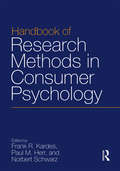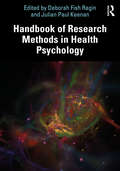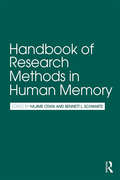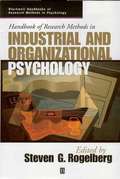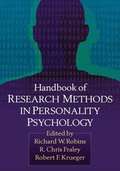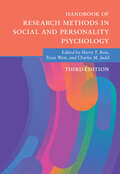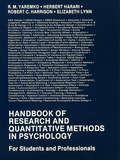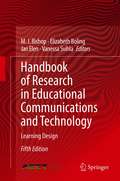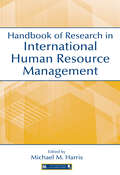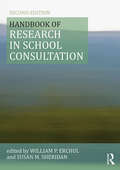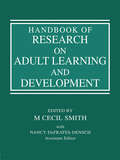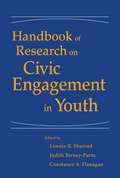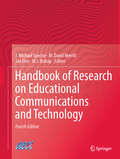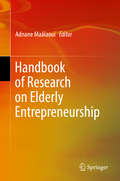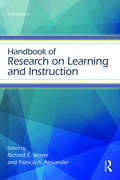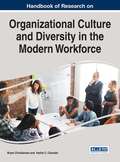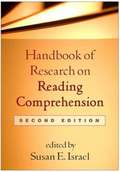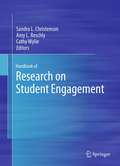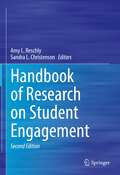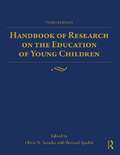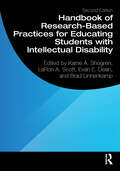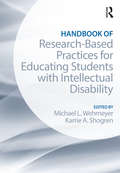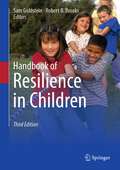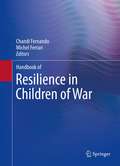- Table View
- List View
Handbook of Research Methods in Consumer Psychology
by Norbert Schwarz Frank R. Kardes Paul P. HerrWhat impact can various research methods have on consumer psychology? How can they help us understand the workings of the consumer mind? And how can the field of consumer psychology best utilize these methods? In the Handbook of Research Methods in Consumer Psychology, leading consumer psychologists summarize key aspects of the research process and explain how different methods enrich understanding of how consumers process information to form judgments and opinions and to make consumption-related decisions. Kardes, Herr, and Schwarz provide an in-depth analysis of the scientific research methods needed to understand consumption-related judgments and decisions. The book is split into five parts, demonstrating the breadth of the volume: classic approaches, contemporary approaches, online research methods, data analysis, and philosophy of science. A variety of leading researchers give insight into a wide range of topics, reflecting both long-standing debate and more recent developments in the field to encourage discussion and the advancement of consumer research. The Handbook of Research Methods in Consumer Psychology is essential reading for researchers, students, and professionals interested in consumer psychology and behavior.
Handbook of Research Methods in Health Psychology
by Deborah Fish Ragin; Julian Paul KeenanIn this comprehensive handbook, Ragin and Keenan present an all-encompassing analysis of the variety of different methods used in health psychology research. Featuring interdisciplinary collaborations from leading academics, this meticulously written volume is a guide to conducting cutting-edge research using tested and vetted best practices. It explains important research techniques, why they are selected and how they are conducted. The book critically examines both cutting-edge methods, such as those used in NextGen genetics, nudge theory, and the brain’s vulnerability to addiction, as well as the classic methods, including cortisol measurement, survey, and environmental study. The topics of the book span the gamut of health psychology field, from neuroimaging and statistical analysis to socioeconomic issues such as the policies used to address diseases in Africa, anti-vaxers, and the disproportionate impact of climate change on impoverished people. With each section featuring examples of best research practices, recommendations for study samples, accurate use of instrumentation, analytical techniques, and advanced-level data analysis, this book will be an essential text for both emerging student researchers and experts in the field and an indispensable resource in health psychology programs.
Handbook of Research Methods in Human Memory
by Bennett L. Schwartz Hajime OtaniThe Handbook of Research Methods in Human Memory presents a collection of chapters on methodology used by researchers in investigating human memory. Understanding the basic cognitive function of human memory is critical in a wide variety of fields, such as clinical psychology, developmental psychology, education, neuroscience, and gerontology, and studying memory has become particularly urgent in recent years due to the prominence of a number of neurodegenerative diseases, such as Alzheimer’s. However, choosing the most appropriate method of research is a daunting task for most scholars. This book explores the methods that are currently available in various areas of human memory research and serves as a reference manual to help guide readers’ own research. Each chapter is written by prominent researchers and features cutting-edge research on human memory and cognition, with topics ranging from basic memory processes to cognitive neuroscience to further applications. The focus here is not on the "what," but the "how"—how research is best conducted on human memory.
Handbook of Research Methods in Industrial and Organizational Psychology (Blackwell Handbooks of Research Methods in Psychology #8)
by Steven G. RogelbergHandbook of Research Methods in Industrial and Organizational Psychology is a comprehensive and contemporary treatment of research philosophies, approaches, tools, and techniques indigenous to industrial and organizational psychology. Only available research handbook for Industrial & Organizational Psychology. Contributors are leading methodological & measurement scholars. Excellent balance of practical and theoretical insights which will be of interest to both novice and experienced organizational researchers. Great companion to the content-oriented Handbooks. Now available in full text online via xreferplus, the award-winning reference library on the web from xrefer. For more information, visit www.xreferplus.com
Handbook of Research Methods in Personality Psychology
by Richard Robins R. Chris FraleyBringing together leading investigators, this comprehensive handbook is a one-stop reference for anyone planning or conducting research on personality. It provides up-to-date analyses of the rich array of methodological tools available today, giving particular attention to real-world theoretical and logistical challenges and how to overcome them. In chapters filled with detailed, practical examples, readers are shown step by step how to formulate a suitable research design, select and use high-quality measures, and manage the complexities of data analysis and interpretation. Coverage ranges from classic methods like self-report inventories and observational procedures to such recent innovations as neuroimaging and genetic analyses.
Handbook of Research Methods in Social and Personality Psychology
by Charles M. Judd Harry T. ReisThis indispensable sourcebook covers conceptual and practical issues in research design, methods of research, and statistical approaches in social and personality psychology. The chapters provide state-of-the-art treatment of various methods, written by key experts in the field. The primary purpose of the Handbook is to provide readable yet comprehensive chapters on the full range of methods and tools used by researchers in social and personality psychology. In addition, it will alert researchers to methodological possibilities they may not have thought of. Innovative research methods work best when they allow researchers to ask theoretically driven questions that could not have been asked previously, thereby enhancing the quality and depth of their empirical knowledge base. With the help of this text, both new and established social psychologists will learn about appropriate uses of each method and the opportunities they provide for expanding knowledge. The Handbook of Research Methods in Social and Personality Psychology will be invaluable to graduate students and established researchers alike.
Handbook of Research Methods in Social and Personality Psychology (Cambridge Handbooks in Psychology)
by Charles M. Judd Harry T. Reis Tessa WestThis indispensable collection provides extensive, yet accessible, coverage of conceptual and practical issues in research design in personality and social psychology. Using numerous examples and clear guidelines, especially for conducting complex statistical analysis, leading experts address specific methods and areas of research to capture a definitive overview of contemporary practice. Updated and expanded, this third edition engages with the most important methodological innovations over the past decade, offering a timely perspective on research practice in the field. To reflect such rapid advances, this volume includes commentary on particularly timely areas of development such as social neuroscience, mobile sensing methods, and innovative statistical applications. Seasoned and early-career researchers alike will find a range of tools, methods, and practices that will help improve their research and develop new conceptual and methodological possibilities. Supplementary online materials are available on Cambridge Core.
Handbook of Research and Quantitative Methods in Psychology: For Students and Professionals
by Elizabeth Lynn R.M. Yaremko Herbert Harari Robert C. HarrisonThis comprehensive reference organizes extensive definitions and examples of key concepts in quantitative research into a single, convenient source. Alphabetically arranged and cross-referenced, The Handbook of Research and Quantitative Methods In Psychology presents: * experimental procedures, * research designs, * statistical methods, * information theory, * psychophysics, * behavioral terminology, * scaling and testing.
Handbook of Research in Educational Communications and Technology: Learning Design
by Jan Elen M. J. Bishop Elizabeth Boling Vanessa SvihlaThe 5th edition of the prestigious AECT Handbook continues previous efforts to reach outside the traditional instructional design and technology community to the learning sciences and computer information systems communities toward developing a conceptualization of the field. However, given the pervasive and increasingly complex role technology now plays in education since the 1st edition of the Handbook in 1996, the editors have reorganized the research chapters in this edition to focus on the learning problems we are trying to solve with educational technologies, rather than to focus on the things we are using to solve those problems. Additionally, for the first time this edition of the Handbook reflects our field’s growing understanding of the importance of design scholarship to inform practice by including design case chapters. These changes for this edition of the Handbook are intended to bring educational technology research into the broader framework of educational research by elaborating on the role instructional design and technology plays as a scholarly discipline in addressing education’s increasingly complex issues.Provides comprehensive reviews of new developments in educational technology research and design practice.Includes concrete examples to guide future research and practice in the ways emerging technologies can be used to solve educational problems.Contains extensive references furnished to guide readers to the most recent research and design practice in the field of instructional design and technology.
Handbook of Research in International Human Resource Management (Organization And Management Ser.)
by Michael M. HarrisHandbook of Research in International Human Resource Management, a book in LEA‘s Organization and Management Series, provides a sophisticated, in-depth examination of research in international human resource management (IHRM). Editor Michael M. Harris compiles research in IHRM that is otherwise fragmented across numerous journals and conducted from
Handbook of Research in School Consultation (Consultation, Supervision, and Professional Learning in School Psychology Series)
by Susan M. Sheridan William P. ErchulNow in its second edition, the Handbook of Research in School Consultation provides the field of school-based consultation with a comprehensive volume examining research perspectives and methodologies, models of practice, and future research directions. Revised and updated, this collection brings together leading experts in the field, offering both producers and consumers of school consultation an invaluable snapshot of the current boundaries and rapidly growing content of the discipline. It touches upon not only the scientific progress of the field, but also upon the variety of cutting-edge techniques and approaches currently being developed with an eye toward a changing world. Perfect for school psychologists, and also appropriate for researchers, trainers, and school-based professionals such as special educators and school counselors, this handbook is an absolute necessity for those keeping pace with the innovating, evolving world of school consultation.
Handbook of Research on Adult Learning and Development
by M Cecil Smith Nancy DeFrates-DenschThe time is right for this comprehensive, state-of-the-art Handbook that analyzes, integrates, and summarizes theoretical advances and research findings on adult development and learning - a rapidly growing field reflecting demographic shifts toward an aging population in Western societies. Featuring contributions from prominent scholars across diverse disciplinary fields (education, developmental psychology, public policy, gerontology, neurology, public health, sociology, family studies, and adult education), the volume is organized around six themes: theoretical perspectives on adult development and learning research methods in adult development research on adult development research on adult learning aging and gerontological research policy perspectives on aging. The Handbook is an essential reference for researchers, faculty, graduate students and practitioners whose work pertains to adult and lifespan development and learning.
Handbook of Research on Civic Engagement in Youth
by Constance A. Flanagan Judith Torney-Purta Lonnie R. SherrodEngaging youth in civic life has become a central concern to a broad array of researchers in a variety of academic fields as well to policy makers and practitioners globally. This book is both international and multidisciplinary, consisting of three sections that respectively cover conceptual issues, developmental and educational topics, and methodological and measurement issues. Broad in its coverage of topics, this book supports scholars, philanthropists, business leaders, government officials, teachers, parents, and community practitioners in their drive to engage more young people in community and civic actions.
Handbook of Research on Educational Communications and Technology
by J. Michael Spector M. David Merrill Jan Elen M. J. BishopThe 4th edition of the Handbook of Research on Educational Communications and Technology expands upon the previous 3 versions, providing a comprehensive update on research pertaining to new and emerging educational technologies. Chapters that are no longer pertinent have been eliminated in this edition, with most chapters being completely rewritten, expanded, and updated Additionally, new chapters pertaining to research methodologies in educational technology have been added due to expressed reader interest. Each chapter now contains an extensive literature review, documenting and explaining the most recent, outstanding research, including major findings and methodologies employed. The Handbook authors continue to be international leaders in their respective fields; the list is cross disciplinary by design and great effort was taken to invite authors outside of the traditional instructional design and technology community.
Handbook of Research on Elderly Entrepreneurship
by Adnane MaâlaouiThis handbook introduces readers to the concept of elderly entrepreneurship, and analyzes key issues concerning individuals and institutions. In addition, it presents theoretical and empirical studies exploring the reasons why elderly persons choose to pursue entrepreneurship, despite their advanced age. To investigate this comparatively new entrepreneurial phenomenon, the contributors address psychological, sociological and gerontological aspects, and share unique interdisciplinary insights. The book’s chapters are methodologically diverse, and the scale of analysis ranges from individual cases to country-level patterns. At a time when the world’s major economies are facing a demographic challenge due to ageing populations, elderly entrepreneurship may provide new economic opportunities and motivate more inclusive policymaking.
Handbook of Research on Learning and Instruction (Educational Psychology Handbook)
by Patricia A. Alexander Richard E. MayerDuring the past 30 years, researchers have made exciting progress in the science of learning (i.e., how people learn) and the science of instruction (i.e., how to help people learn). This second edition of the Handbook of Research on Learning and Instruction is intended to provide an overview of these research advances. With chapters written by leading researchers from around the world, this volume examines learning and instruction in a variety of learning environments including in classrooms and out of classrooms, and with a variety of learners including K-16 students and adult learners. Contributors to this volume demonstrate how and why educational practice should be guided by research evidence concerning what works in instruction. The Handbook is written at a level that is appropriate for graduate students, researchers, and practitioners interested in an evidence-based approach to learning and instruction. The book is divided into two sections: learning and instruction. The learning section consists of chapters on how people learn in reading, writing, mathematics, science, history, second language, and physical education, as well as how people acquire the knowledge and processes required for critical thinking, studying, self-regulation, and motivation. The instruction section consists of chapters on effective instructional methods—feedback, examples, questioning, tutoring, visualizations, simulations, inquiry, discussion, collaboration, peer modeling, and adaptive instruction. Each chapter in this second edition of the Handbook has been thoroughly revised to integrate recent advances in the field of educational psychology. Two chapters have been added to reflect advances in both helping students develop learning strategies and using technology to individualize instruction. As with the first edition, this updated volume showcases the best research being done on learning and instruction by traversing a broad array of academic domains, learning constructs, and instructional methods.
Handbook of Research on Organizational Culture and Diversity in the Modern Workforce
by Bryan Christiansen Harish C. ChandanIn today's globalized economy, an understanding of organizational culture and diversity in the modern workforce is crucial to increasing corporate productivity and profit. This publication provides useful reference material for business and government executives, researchers, and undergraduate/graduate students for guidance in the areas of human resource management, occupational health, and well-being at work including work-life balance and firm performance. <p><p> Insights into relative perspectives in culture theories such as the Gothberg IV Model and Hofstede's Model are presented in cross-cultural industrial settings. Qualitative methods in organizational and industrial psychology research are discussed. The latest research on sexual harassment in digital environments, managerial bullying, incivility at work and organizational diversity including inclusion of people with disabilities is presented. <p> Recent research on work-related micro organizational behavior human factors, cynical individual factor, employee empowerment and organizational cynicism, and organizational justice is presented. Leadership traits and active listening and emotional intelligence at work are discussed. Business and industrial organizations can use these articles for guidance in the areas of talent retention and development and international assignments.
Handbook of Research on Reading Comprehension, Second Edition
by Gerald G. Duffy Susan E. IsraelThis esteemed reference work and professional resource, now substantially revised, integrates classic and cutting-edge research on how children and adolescents make meaning from text. The comprehension tasks and challenges facing students at different grade levels are explored, with attention to multiple text types and reading purposes. Preeminent researchers offer a range of perspectives--cognitive, neuroscientific, sociocultural, pedagogical, and technological--on key aspects of comprehension. Effective approaches to assessment, instruction, and intervention are reviewed. The volume also addresses issues in teaching specific populations, including struggling readers and English language learners. New to This Edition *A decade's worth of significant research advances are reflected in 10 entirely new chapters. *Revised throughout to incorporate new studies and timely topics: the expanding role of technology, changing school populations, the Common Core standards, international research, and more. *Chapters on graphic, scientific, and multiple digital texts. *Chapters on fluency, professional learning, and literacy coaching.
Handbook of Research on Student Engagement
by Cathy Wylie Amy L. Reschly Sandra L. ChristensonFor more than two decades, the concept of student engagement has grown from simple attention in class to a construct comprised of cognitive, emotional, and behavioral components that embody and further develop motivation for learning. Similarly, the goals of student engagement have evolved from dropout prevention to improved outcomes for lifelong learning. This robust expansion has led to numerous lines of research across disciplines and are brought together clearly and comprehensively in the Handbook of Research on Student Engagement. The Handbook guides readers through the field's rich history, sorts out its component constructs, and identifies knowledge gaps to be filled by future research. Grounding data in real-world learning situations, contributors analyze indicators and facilitators of student engagement, link engagement to motivation, and gauge the impact of family, peers, and teachers on engagement in elementary and secondary grades. Findings on the effectiveness of classroom interventions are discussed in detail. And because assessing engagement is still a relatively new endeavor, chapters on measurement methods and issues round out this important resource. Topical areas addressed in the Handbook include: Engagement across developmental stages.Self-efficacy in the engaged learner.Parental and social influences on engagement and achievement motivation.The engaging nature of teaching for competency development.The relationship between engagement and high-risk behavior in adolescents.Comparing methods for measuring student engagement.An essential guide to the expanding knowledge base, the Handbook of Research on Student Engagement serves as a valuable resource for researchers, scientist-practitioners, and graduate students in such varied fields as clinical child and school psychology, educational psychology, public health, teaching and teacher education, social work, and educational policy.
Handbook of Research on Student Engagement
by Amy L. Reschly Sandra L. ChristensonThe second edition of the handbook reflects the expanding growth and sophistication in research on student engagement. Editorial scope and coverage are significantly expanded in the new edition, including numerous new chapters that address such topics as child and adolescent well-being, resilience, and social-emotional learning as well as extending student engagement into the realm of college attendance and persistence. In addition to its enhanced focus on student engagement as a means for promoting positive youth development, all original chapters have been extensively revised and updated, including those focusing on such foundational topics related to student engagement as motivation, measurement, high school dropout, school reform, and families. Key areas of coverage include:Demography and structural barriers to student engagement.Developmental and social contexts of student engagement.Student engagement and resilience.Engaging students through effective academic instruction and classroom management.Social-emotional learning and student mental health and physical well-being.Student engagement across the globe, languages, and cultures. The second edition of the Handbook of Research on Student Engagement is the definitive resource for researchers, scientist-practitioners and clinicians as well as graduate students in such varied fields as clinical child and school psychology, social work, public health, educational psychology, teaching and teacher education, educational policy, and all interrelated disciplines.
Handbook of Research on the Education of Young Children
by Olivia N. Saracho Bernard SpodekThe Handbook of Research on the Education of Young Children is the essential reference on research on early childhood education throughout the world. This singular resource provides a comprehensive overview of important contemporary issues as well as the information necessary to make informed judgments about these issues. The field has changed significantly since the publication of the second edition, and this third edition of the handbook takes care to address the entirety of vital new developments. A valuable tool for all those who work and study in the field of early childhood education, this volume addresses critical, cutting edge research on child development, curriculum, policy, and research and evaluation strategies. With a multitude of new and updated chapters, The Handbook of Research on the Education of Young Children, 3rd Edition makes the expanding knowledge base related to early childhood education readily available and accessible.
Handbook of Research-Based Practices for Educating Students with Intellectual Disability
by Karrie A. Shogren LaRon A. Scott Evan E. Dean Brad LinnenkampNow in its second edition, this comprehensive handbook emphasizes research-based practices for educating students with intellectual disability across the life course, from early childhood supports through the transition to adulthood.Driven by the collaboration of accomplished, nationally recognized professionals of varied approaches, lived experience and expertise, and philosophies, the book is updated with new theory and research-based practices that have been shown to be effective through multiple methodologies, to help readers select interventions and supports based on the evidence of their effectiveness. Considering the field of intellectual disability from a transdisciplinary perspective, it integrates a greater focus on advancing equity in educational outcomes for students.This book is a professional resource and graduate level text for preservice and in-service educators, psychologists, speech/language therapists and other clinicians involved in the education of children, youth, and adults with intellectual disability.
Handbook of Research-Based Practices for Educating Students with Intellectual Disability
by Michael L. Wehmeyer Karrie A. ShogrenThe Handbook of Research-Based Practices for Educating Students with Intellectual Disability provides an integrated, transdisciplinary overview of research-based practices for teaching students with intellectual disability. This comprehensive volume emphasizes education across life stages, from early intervention in schools through the transition to adulthood, and highlights major educational and support needs of children and youth with intellectual disability. The implications of history, recent research, and existing information are positioned to systematically advance new practices and explore promising possibilities in the field. Driven by the collaboration of accomplished, nationally recognized professionals of varied approaches and philosophies, the book emphasizes practices that have been shown to be effective through multiple methodologies, so as to help readers select interventions based on the evidence of their effectiveness.
Handbook of Resilience in Children
by Sam Goldstein Robert B. BrooksThe third edition of this handbook addresses not only the concept of resilience in children who overcome adversity, but it also explores the development of children not considered at risk addressing recent challenges as a consequence of the COVID-19 pandemic. The new edition reviews the scientific literature that supports findings that stress-hardiness and resilience in all children leads to happier and healthier lives as well as improved functionality across the lifespan. In this edition, expert contributors examine resilience in relation to environmental stressors as phenomena in child and adolescent disorders and as a means toward positive adaptation into adulthood. The significantly expanded third edition includes new and significantly revised chapters that explore strategies for developing resilience in families, clinical practice, and educational settings as well as its nurturance in caregivers and teachers. Key areas of coverage include: Exploration of the four waves of resilience research. Resilience in gene-environment transactions. Resilience in boys and girls. Resilience in family processes. Asset building as an essential component of intervention. Assessment of social and emotional competencies related to resilience. Building resilience through school bullying prevention. Resilience in positive youth development. Enhancing resilience through effective thinking. The Handbook of Resilience in Children, Third Edition, is an essential reference for researchers, clinicians and allied practitioners, and graduate students across such interrelated disciplines as child and school psychology, social work, public health as well as developmental psychology, special and general education, child and adolescent psychiatry, family studies, and pediatrics.
Handbook of Resilience in Children of War
by Michel Ferrari Chandi FernandoTheir frightened, angry faces are grim reminders of the reach of war. They are millions of children, orphaned, displaced, forced to flee or to fight. And just as they have myriad possibilities for trauma, their lives also hold great potential for recovery. The Handbook of Resilience in Children of War explores these critical phenomena at the theoretical, research, and treatment levels, beginning with the psychosocial effects of exposure to war. Narratives of young people's lives in war zones as diverse as Afghanistan, Sri Lanka, Columbia, and Sudan reveal the complexities of their experiences and the meanings they attach to them, providing valuable keys to their rehabilitation. Other chapters identify strengths and limitations of current interventions, and of constructs of resilience as applied to youth affected by war. Throughout this cutting-edge volume, the emphasis is on improving the field through more relevant research and accurate, evidence-based interventions, in such areas as: An ecological resilience approach to promoting mental health in children of war.Child soldiers and the myth of the ticking time bomb.The Child Friendly Spaces postwar intervention program.The role of education for war-zone immigrant and refugee students.Political violence, identity, and adjustment in children.The Handbook of Resilience in Children of War is essential reading for researchers, scientist-practitioners, and graduate students in diverse fields including clinical child, school, and developmental psychology; child and adolescent psychiatry; social work; counseling; education; and allied medical and public health disciplines.
